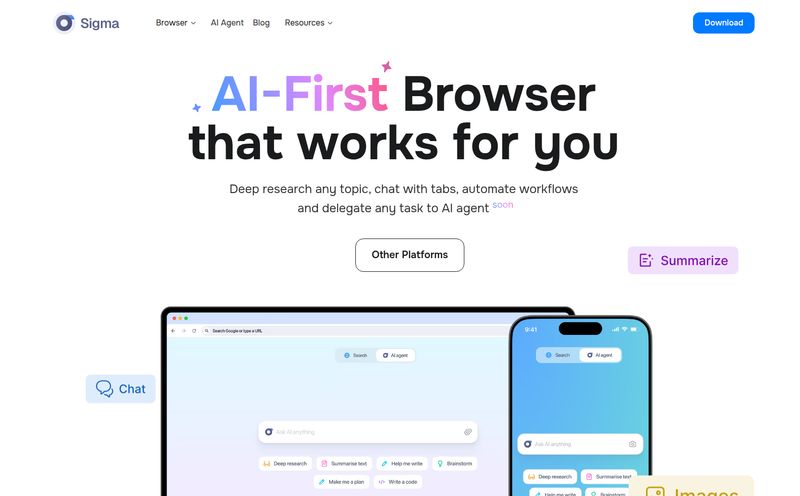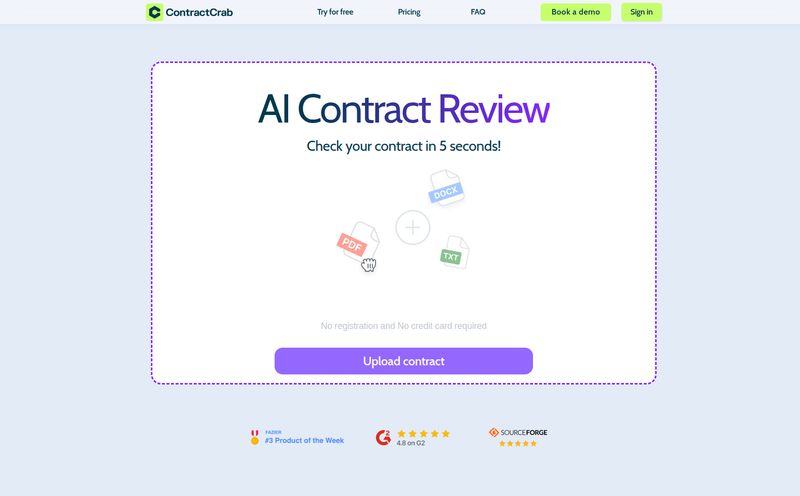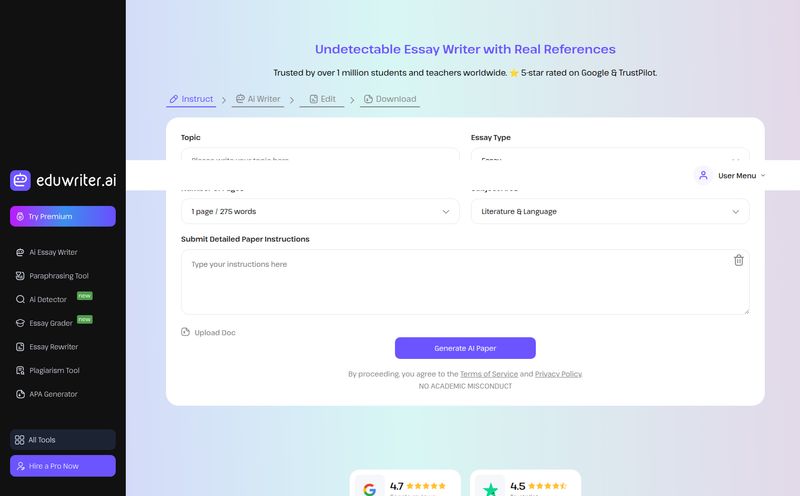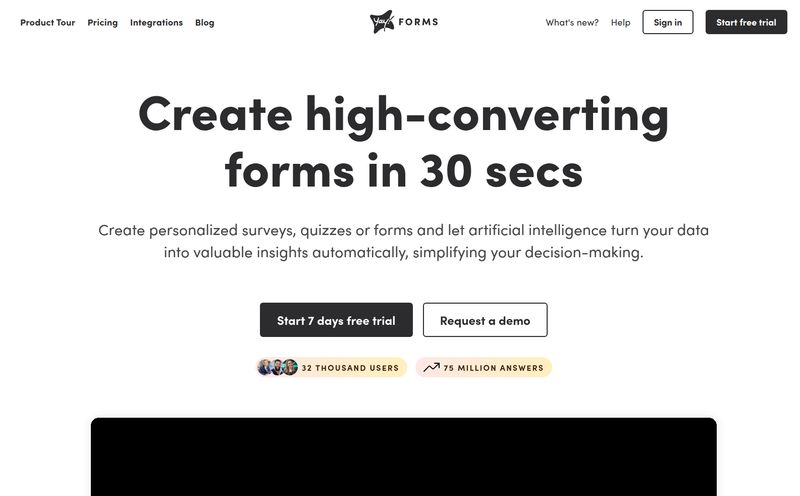If you're a developer who's ever had to pull text out of... well, anything, you know the pain. You start with a simple request: "I just need the text from this PDF." Simple, right? Ha. An hour later, you’re staring at three different browser tabs for three different services. One for handling the PDF itself, another for OCR because—surprise!—the PDF has images. And a third for transcribing that one pesky audio file the client just sent over. It’s a mess of API keys, different pricing models, and enough documentation to make your head spin.
I've been there, and frankly, I’m over it. This whole song and dance of stitching together a Frankenstein's monster of APIs feels so... 2022. That’s why when I stumbled upon a tool called getTxt.AI, my curiosity was definitely piqued. It makes a bold promise: one single API call to extract text and markdown from documents, audio, images, and video.
Could this actually be the unified solution we've been waiting for? Let’s find out.
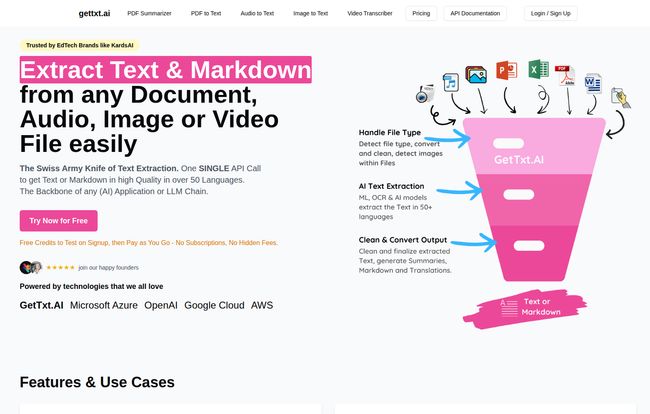
Visit getTxt.AI
So, What is getTxt.AI, Really?
Think of getTxt.AI as a universal translator and a hyper-efficient secretary all rolled into one API. At its core, it's a developer tool designed to be the backbone for text-heavy applications. Instead of you having to figure out if you're dealing with a DOCX, a PNG, an MP3, or a PDF, you just point getTxt.AI at the file. It does the heavy lifting.
It’s built to handle pretty much any common file type you can throw at it—from standard office documents and PDFs to images needing Optical Character Recognition (OCR) and even audio/video files that need transcription. And it doesn't just stop at getting the raw text. It can also summarize it and translate it into over 50 languages. All in the same go. That’s the big idea, anyway.
The API Spaghetti Problem We All Hate
To really get why something like getTxt.AI is interesting, you have to appreciate the problem it’s trying to solve. I call it the 'API Spaghetti' problem.
The traditional way of building an app that handles multiple file types is a nightmare. Your workflow looks something like this:
- For DOCX/PPTX: You find a library or API for that.
- For PDFs with text: Another library.
- For PDFs with images (or just plain JPEGs): Now you need an OCR service, like Google Vision or AWS Textract. That's a whole new integration.
- For Audio/Video: Time to integrate a transcription service like AssemblyAI or OpenAI's Whisper.
- Need Summaries? Okay, now you're piping that extracted text into an LLM via yet another API call to something like OpenAI or Anthropic.
Before you know it, you're managing half a dozen SDKs, multiple billing accounts, and your code is a tangle of conditional logic. It’s slow to build and a pain to maintain. getTxt.AI’s entire pitch is that this is absurd. Their approach simplifies this into a single, clean API call. You send the file, specify what you want (text, markdown, a summary), and get a neat JSON response. Done. The difference in development time is literally hours versus weeks.
The Features That Actually Matter
Alright, bold claims are one thing. Let's look at the actual features and what they mean for you, the developer on the ground.
The Simplicity of a Single API Call
This is the main event. Looking at their documentation, the integration is ridiculously straightforward. It's a simple POST request to their endpoint. You provide a URL to your file and tell it what you want. The fact that I don't need to write custom logic to first identify a file type and then route it to a specific service is a massive win. It just feels... clean. This dramatically lowers the barrier to entry for building powerful features, especially for small teams or solo devs who are building out a modern RAG pipeline.
Summarization and Translation on the Fly
Here’s where it gets really clever. You're already processing a file to get the text, right? With getTxt.AI, you can add a simple parameter like "summary": "short" or "lang": "de" to your request, and it will return a summary or a German translation alongside the extracted text. This is hugely efficient. You're not making a second or third API call. It saves time, money, and complexity. It’s one of those “why didn’t I think of that?” features that just makes sense.
Automatic Markdown Conversion
This might seem like a small thing, but I love it. Getting a wall of raw text is fine, but getting it back in clean, structured Markdown is even better. Headings, lists, and basic formatting are preserved. If you're building a content management system, a knowledge base, or any app that displays the extracted text, this feature saves you a ton of post-processing headaches. It’s a thoughtful touch that shows they understand the developer experience (DX).
Let's Talk Money: The getTxt.AI Pricing Model
Okay, this is where the rubber meets the road. A great tool is only great if you can afford it. getTxt.AI uses a credit-based system, which I find pretty transparent. They offer both pay-as-you-go and monthly subscription plans.
Here's a quick breakdown:
| Plan Type | Credits | Price | Cost Per Credit |
|---|---|---|---|
| One-Time | 100 | $1.50 | $0.0150 |
| One-Time | 1,000 | $9.99 | $0.0100 |
| One-Time | 7,000 | $59.99 | ~$0.0086 |
| Basic Monthly | 500 / month | $9.99 | $0.0200 |
| Standard Monthly | 2,000 / month | $29.99 | $0.0150 |
| Pro Monthly | 5,000 / month | $59.99 | $0.0120 |
Note: This is based on pricing at the time of writing. Always check their official pricing page for the latest details.
So what does a "credit" get you? They estimate 1 credit is roughly equal to 1 page/image for OCR or about 6 seconds of audio transcription. This makes it pretty easy to estimate costs. The one-time, pay-as-you-go plans are fantastic for smaller projects, testing things out, or for apps with unpredictable usage. The monthly plans are better for established products with a steady stream of processing needs.
Where It Shines and Where It Might Stumble
No tool is perfect. In my opinion, here's the honest breakdown of getTxt.AI.
What I love is the sheer simplicity and consolidation. The value of replacing five potential integrations with one is immense. It saves development time, maintenance overhead, and mental energy. The pricing is transparent and seems very reasonable, especially for startups and mid-sized projects. Having predictable costs is a huge relief compared to the variable, and sometimes terrifying, bills from larger cloud providers.
On the flip side, if your application has truly massive scale—I'm talking millions of documents per day—the pay-as-you-go model might become more expensive than negotiating a bulk rate directly with a major cloud provider for one specific service. Also, you are inherently relying on a third-party service. If gettxt.ai has an outage, your text extraction features are down. That's the nature of any API, but it's something to consider for mission-critical applications where you might want redundant systems.
My Final Take: Is getTxt.AI Worth Your Time?
So, do I think getTxt.AI is worth it? Yes, absolutely. Especially for a specific type of user.
If you're a solo developer, a small agency, or a startup building an AI-powered app, getTxt.AI feels like a no-brainer. The amount of time and complexity it saves is worth its weight in gold. It lets you focus on building your core product instead of getting bogged down in the plumbing of text extraction. It's for the developer who values their time and sanity.
If you're a massive enterprise with a dedicated team just for document processing, you might already have the complex, multi-provider system in place. But even then, I'd argue getTxt.AI is perfect for rapid prototyping and internal tools. For everyone else in between, it's a seriously compelling alternative to the status quo.
Frequently Asked Questions
What file types does getTxt.AI support?
It handles a wide range, including PDF, DOCX, PPTX, XLSX, images (JPG, PNG, WebP), audio files (MP3, WAV, M4A), and video files (MP4, MOV, AVI). It aims to be a one-stop-shop for most common formats.
How does the credit system actually work?
It's a pay-for-what-you-use model. You buy credits, and each action consumes a certain number of them. Based on their site, 1 credit gets you about one page of OCR from an image or PDF, or about 6 seconds of transcribed audio. This makes it fairly easy to estimate your usage costs.
Can I really translate documents with getTxt.AI?
Yes. You can specify a target language code (like "es" for Spanish or "fr" for French) in your API request, and it will return the extracted text in that language. It supports over 50 languages.
Is there a free trial to test it out?
There isn't a traditional "free" trial, but the smallest one-time plan is only $1.50 for 100 credits. This is more than enough to thoroughly test the API with your own files and see if it fits your needs. I'd consider that a very low-risk way to try it.
Is getTxt.AI a good choice for large enterprise applications?
It depends. For many enterprise use cases, especially for new projects or internal tools, its simplicity and predictable cost are a huge advantage. For extremely high-volume, cost-sensitive operations that only need one specific function (e.g., only OCR), a direct deal with a major provider might be cheaper, but would come with higher development and maintanance costs.
Conclusion
In a world where developers are constantly asked to do more with less, tools that reduce complexity are not just nice-to-haves; they are essential. getTxt.AI is a fantastic example of this. It takes a genuinely annoying, fragmented problem and solves it with an elegant, unified solution. It's not trying to be the cheapest for every single edge case, but it's aiming to be the simplest and most efficient for 95% of them. And in my book, that's a massive win.
Reference and Sources
- getTxt.AI Official Website
- getTxt.AI Pricing Page
- AWS Textract - An example of a standalone OCR/document analysis service.
